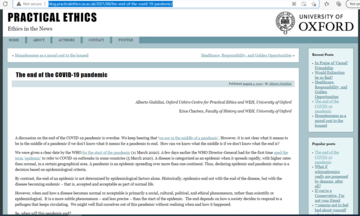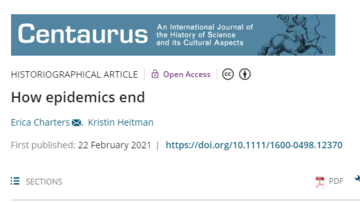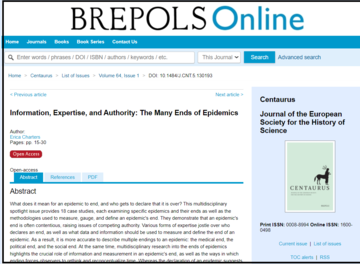Publications
|
As COVID‐19 drags on and new vaccines promise widespread immunity, the world's attention has turned to predicting how the present pandemic will end. How do societies know when an epidemic is over and normal life can resume? What criteria and markers indicate such an end? Who has the insight, authority, and credibility to decipher these signs? This article examines the ways in which scholars have identified and described the end stages of previous epidemics, pointing out that significantly less attention has been paid to these periods than to origins and climaxes. A multidisciplinary analysis of how epidemics end suggests that epidemics should therefore be framed not as linear narratives—from outbreak to intervention to termination—but within cycles of disease and with a multiplicity of endings. Charters, E, Heitman, K. How epidemics end. Centaurus. 2021; 63: 210– 224. https://doi.org/10.1111/1600-0498.12370 |
|
|
What does it mean for an epidemic to end, and who gets to declare that it is over? This multidisciplinary spotlight issue provides 18 case studies, each examining specific epidemics and their ends as well as the methodologies used to measure, gauge, and define an epidemic's end. They demonstrate that an epidemic's end is often contentious, raising issues of competing authority. Various forms of expertise jostle over who declares an end, as well as what data and information should be used to measure and define the end of an epidemic. As a result, it is more accurate to describe multiple endings to an epidemic: the medical end, the political end, and the social end. At the same time, multidisciplinary research into the ends of epidemics highlights the crucial role of information and measurement in an epidemic's end, as well as the ways in which ending forces observers to rethink and reconceptualize time. Centaurus. Journal of the European Society for the History of Science, Volume 64 (2022), Issue 1. Spotlight Issue: How Epidemics End, edited by Erica Charters. 311 p., 13 colour ill., 178 x 254 mm, 2022 ISBN: 978-2-503-59852-9 Print ISSN: 0008-8994 Online ISSN: 1600-0498 |
| Table of Contents | |
|
Erica Charters
|
|
|
Natalie M. Linton, Francesca A. Lovell-Read, Emma Southall, Hyojung Lee, Andrei R. Akhmetzhanov, Robin N. Thompson, Hiroshi Nishiura
|
|
|
Nils Chr. Stenseth, Katharine R. Dean, Barbara Bramanti
|
The End of Plague in Europe, pp. 61 - 72
|
|
Lori Jones
|
|
|
Paul Slack
|
|
|
Xiaoping Fang
|
|
|
Atsuko Naono |
“Going ‘the Last Mile’ to Eliminate Malaria” in Myanmar?, pp. 119 - 132 |
|
Jean Segata |
Chikungunya in Brazil, an Endless Epidemic, pp. 133 - 144 |
|
Virginia Berridge |
The Many Endings of Recent Epidemics: HIV/AIDS, Swine Flu 2009, and Policy, pp. 145 - 154 |
|
Cristiana Bastos, Jr. |
The Never-Ending Poxes of Syphilis, AIDS, and Measles, pp. 155 - 170 |
|
Christoph Gradmann |
This is the End: Eradicating Tuberculosis in Modern Times, pp. 171 - 180 |
|
Clark Spencer Larsen, Fabian Crespo |
Paleosyndemics: A Bioarchaeological and Biosocial Approach to Study Infectious Diseases in the Past, pp. 181 - 196 |
|
James L. A. Webb, Jr. |
Historical Epidemiology and the Single Pathogen Model of Epidemic Disease, pp. 197 - 206 |
|
Samuel K. Cohn, Jr. |
Epidemics that End with a Bang, pp. 207 - 216 |
| Paul Kelton |
The End of Smallpox for Indigenous Peoples in the United States, 1898–1903: An Unnoticed Finale, pp. 217 - 230 |
|
Margaret Pelling |
Mythological Endings: John Snow (1813–1858) and the History of American Epidemiology, pp. 231 - 248 |
|
Roderick Bailey |
Ends and Means: Typhus in Naples, 1943–1944, pp. 249 - 260 |
|
Arthur Rose |
Closure and the Critical Epidemic Ending, pp. 261 - 272 |
|
Einar Wigen |
The Multiple Temporalities of Epidemic Endings, pp. 273 - 286 |

|
New blog post by Alberto Giubilini (Oxford Uehiro Centre for Practical Ethics and WEH, University of Oxford) and Erica Charters (Faculty of History and WEH, University of Oxford) How will the COVID-19 pandemic end? And who gets to decide? This new post by Alberto Giubilini and Erica Charters explores these questions on Oxford's Practical Ethics blog. |




